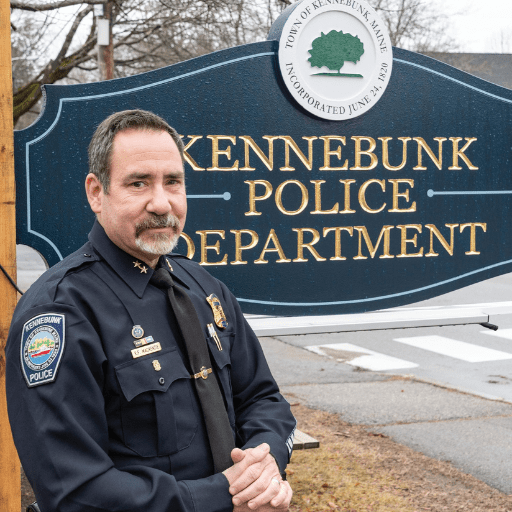Like stock brokerage firm E.F. Hutton, when Kennebunk Police Chief Bob MacKenzie speaks, people listen. That’s a reputation he’s earned by building trust and respect over a 34-year law enforcement career.
In his field, those virtues are required for interactions to go well, but he acknowledged that there is often deep-rooted distrust and stigma to overcome first.
Bob’s big efforts to do just that –for not only his law enforcement community but also for people in recovery from addictions – are paying off.
He is one the biggest supporters of Maine’s greater recovery community, and his reputation is helping him to be an effective advocate. Bob’s philosophy of treating everyone with respect is the cornerstone of his training presentations around the state, which are going a long way toward helping people see both police and people in recovery in a more open and fair light.
In these sessions, he shares information about naloxone (Narcan), stigma, CPR, and experiences both professional and personal – he, like most of us, has family members in recovery.
He talks to Rotary Clubs, Chambers of Commerce, students, and faith-based organizations, to name just a few, and he has now trained literally thousands of people in Maine and New Hampshire. Members of the media attend and report on his sessions, helping to amplify the message.
Bob’s reach broadened when U.S. Sens. Susan Collins (R-Maine) and Bernie Sanders (D-Vermont) invited him to present information to members of Congress about naloxone and stigma reduction – as well as to share his thoughts about what is needed to address the substance use crisis in Maine and the nation.
“I’d be hard-pressed to find anyone who is more committed to ending the stigma about addictions and celebrating successes,” said Carolyn Delaney, publisher of Journey Magazine. “He’s done so much to support Journey’s mission to amplify hope and change the way people in recovery are perceived.”
Bob says educating people –including fellow officers – is key to bringing about change, but it can be a slow process – and not always easy.
He notes that a police officer is often the first person in contact with someone experiencing a crisis related to substance misuse. And how that officer chooses to deal with the situation can be crucial for the person in crisis and their family.
“You can try to win the person’s trust and potentially align the person with resources to get the help they need to successfully live with their disease,” he said, but “an individual in a crisis situation may not be ready to take action at the time of the event. But if you build trust and stay in touch with the person from time to time, you don’t know what impression you’ve made on them and how your relationship has helped them.”
In many ways, his department has come a long way toward making sure every police officer treats people who use drugs and alcohol in the same respectful way, Bob said. But it’s been a long road, and there is more work to be done.
When he first became an officer, the chief said things were more black and white – if someone broke the law, they were jailed. Job done. But over time, he recognized the same individuals were being picked up, jailed, let go, and the cycle repeated over and over.
“I began to see this revolving door approach was not working,” said Bob. “I wanted to know what the root cause was so we could fix it. I quickly realized the cause was substance use disorder.”
Since then, he has continually been educating officers about the realities of SUD and how to best serve community members.
“Every officer in the Kennebunk Police Department has been trained about the harmful effects of stigma, which often creates a barrier for people getting well,” Bob said.
“They’ve been trained in how to use Narcan, and about empathy and compassion. Stigma is the very first thing that needs to be abolished.”
“How we reduce the stigma is to humanize it. Substance misuse happens in many families. The person you have arrested is someone’s loved one. And anyone can get better. We have to remember that.”
When he says “we,” he’s including members of law enforcement, other first responders, and medical professionals.
Bob is a member of the Maine Criminal Justice Committee that recommends mandated annual training for state law enforcement agencies. He is proud of influencing the subject matter of the annual training for two years running to be related to effective practices in dealing with crimes charged against individuals who are living with substance use disorders.
He said he sees a change happening in the way fellow law enforcement professionals and others perceive and treat those living with substance use disorder. “If we work together, we can save lives, reduce crime and save money,” he said. “It’s a no brainer.”
Note: The state’s revised Good Samaritan Law protects anyone who is helping at the scene of an overdose from legal repercussions for non-violent crimes, such as unpaid drug fines, paraphernalia charges, probation violations, arrest warrants, possession of illegal substances, etc. There is no need to feel it is unsafe for you to call for help during a life-threatening crisis situation. Your community OPTIONS liaison can help navigate resources and support people getting on a path to recovery. Visit https://knowyouroptions.me/aboutoptions/ for information.



